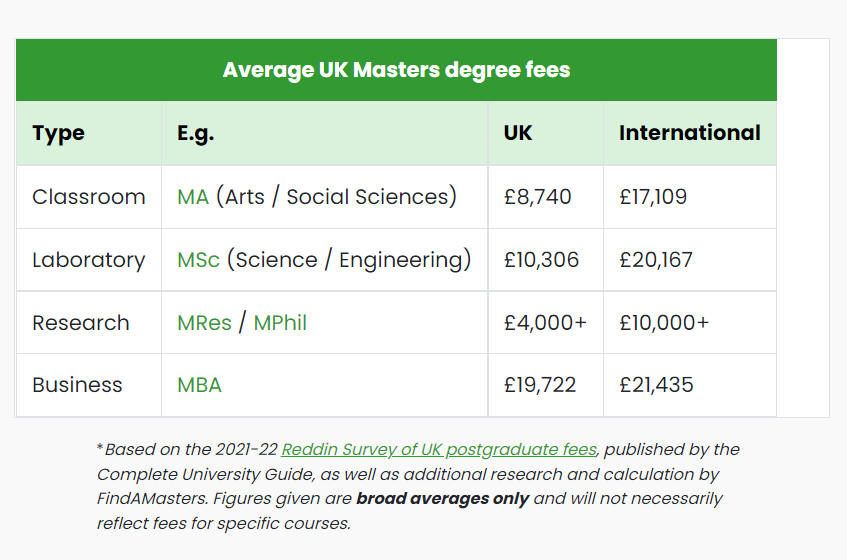Ireland’s higher education system is excellent and considered one of the best in Europe. You also get the advantage of being able to work in Ireland if you graduate from an Irish college or university. Many Indian students find a job within a few months of graduation.
The Irish government focuses on research and education, which is evident in the quality of higher education in Ireland. A Master’s in Ireland for Indian students is an excellent way to exploit this aspect of the Irish education system.
Exciting Reasons to Pursue a Master’s in Ireland for Indian Students
You don’t require a GRE
This is a major advantage compared to studying in the US. Leading Irish universities like Trinity and UCD do not require students from India to furnish GRE scores to pursue an MS in Ireland. Although, you will need good academic performance and proof of English language proficiency.
Although most Irish universities don’t require GRE and GMAT, some universities require GMAT scores for their MBA programs.
Study gaps are not an issue
Irish universities do not mind long gaps in education if you can provide a reasonable explanation during the admission process.
Reasons like employment, health issues, and business ventures are some reasonable explanations that should not stand in your way of pursuing a Master’s in Ireland. You can talk about your study gap in your Statement of Purpose.
You don’t have to learn a new language
English is the preferred language for all higher education institutions in Ireland. And most people speak English too.
This gives you the advantage of not having to learn a new language just to pursue your Master’s. Although, you will have to pass an English language proficiency test to qualify for an MS in Ireland.
| English Language Proficiency Test | Minimum Required Score |
| TOEFL (Internet-Based) | 88 |
| IELTS | 6.5 (6.0/component) |
| PTE (Academic) | 6.3 |
The Cost of a Master’s in Ireland for Indian Students is Low
The tuition for a Master’s in Ireland is calculated based on the student’s nationality. Students from the EU and EEA can expect to pay between ₹ 3.6 lakhs and ₹ 8.2 lakhs for one year of full-time study. The tuition for expensive programmes like medicine and business can get twice or thrice the above range.
Students outside the EU and EEA can expect to pay higher tuition, with ₹ 8.19 lakhs per year being the minimum. Some courses can be more expensive, costing around ₹ 28.4 lakhs per year. Once again, expensive programmes like medicine and business will likely be more expensive.
It is noteworthy that the average cost of a master’s degree in the US for an out-of-state student can range between ₹ 23lakhs and ₹ 1.1 crores. The tuition in Ireland is comparatively very affordable.
A master’s degree in the UK can cost you from ₹ 9.6 lakhs for an MRes/MPhil to ₹ 19 lakhs for an MSc. Once again, this is considerably higher than what you’d pay for a degree from an equally good Irish university.

Scholarship for a Master in Ireland for Indian Students
Scholarships are a great way to help you handle the financial needs of pursuing a Master’s degree in a foreign nation. Sometimes universities offer fee waivers to students or will provide partial scholarships out of charitable endowments.
Some famous scholarships that can help you pursue an MS in Ireland are,
- Government of Ireland International Education Scholarship: It is managed by Ireland’s Higher Education Authority (HEA) and is awarded to successful non-EU/EEA nationals. It funds one year of a Master’s programme at an Irish university. The benefits are:
- 2 x ₹ 4.12 lakh stipends to cover living costs.
- Full tuition fee waiver.
- The Department of Education and Skills funds the government of Ireland’s Postgraduate Scholarship Programme. Students can utilize this scholarship to fund a research Masters or a Ph.D. programme. It is noteworthy that this is not a discipline-specific scholarship. The benefits include:
- An annual stipend of ₹ 15 lakhs.
- Tuition fees contribution of up to ₹ 4.74 lakhs per year.
- Research fund contribution of ₹ 2.68 lakhs per year.
- Irish Research Council Employment-Based Postgraduate Programme: This scholarship is administered by the Irish Research Council. It allows students to pursue a research Master’s or a Ph.D. along with an Irish employment partner.
- Your employer will be expected to pay you a minimum of ₹ 7.42 lakhs toward salary/travel expenses. The scholarship provides you with an additional ₹ 22.6 lakhs per year.
- Irish Aid Fellowships: The Irish Department of Foreign Affairs and Trade (DFAT) provides this scholarship through its Irish Aid Fellowships scheme. The benefits of the scholarship include:
- Tuition fee wavier
- Travel expenses
- Living expenses and accommodation
- International scholarships from Irish universities: Universities also provide individual scholarships to students based on merit. This can be anything from a tuition fee waiver to a fully-funded Master’s programme. Here is a list of top Irish universities hyperlinked to their respective scholarship pages,
- Trinity College Dublin
- University College Dublin
- NUI Galway
- Maynooth University
- University College Cork
- Dublin City University
- Inlaks Shivdasani Scholarships: This is an Indian student-specific scholarship offered to students opting to pursue a Master’s at top Irish universities. The scholarship offers up to ₹ 78 lakhs.
- National Overseas Scholarship: Low-income students of select categories can receive this scholarship. The categories include Traditional Artisans, Landless Agricultural Labourers, Denotified Nomadic and Semi-Nomadic Tribes, and Scheduled Castes. The benefits include,
- Annual living cost allowance of up to ₹ 12 lakhs.
- Tuition fees
- Travel expenses
- Visa fees
Studying a Master’s in Ireland for Indian Students
Ireland has one of the lowest numbers of universities in the British Isles. But when it comes to the quality of education and institutions, Ireland is no slouch.
Universities in Ireland are among the most respected in all of Europe. The table below represents how they fare against the other universities of the world.
| Ranking of Irish Universities (2022) | |||
|---|---|---|---|
| University | Times Higher Education Rankings | QS World University Ranking | Academic Ranking of World Universities 2021 |
| Trinity College Dublin | 146 | 101 | 151-200 |
| Dublin City University | 501-600 | 490 | – |
| Maynooth University | 501-600 | 751-800 | – |
| National University of Ireland, Galway | 351-400 | 258 | 401-500 |
| RCSI University of Medicine and Health Sciences | 201-250 | – | – |
| Technological University Dublin | 1001-1200 | 801-1000 | – |
| University College Cork | 251-300 | 298 | 301-400 |
| University College Dublin | 201-250 | 173 | 301-400 |
| University of Limerick | 601-800 | 501-510 | 901-1000 |
Although Dublin is a major hub for educational institutions, there are several universities across the Emerald Isle. You can pick one among the following cities to pursue your MS in Ireland, Dublin, Cork, Galway and Limerick.
Top universities for an MS in Ireland
- Dublin City University
- Maynooth University (National University of Ireland, Maynooth)
- Munster Technological University
- National University of Ireland, Galway
- Technology University Dublin
- Trinity College Dublin
- University College Cork
- University College Dubin
- University of Limerick
Top Institutes of technology in Ireland:
- Waterford Institute of Technology
- Limerick Institute of Technology
- Letterkenny Institute of Technology
- Institute of Technology Tralee
- Institute of Technology Sligo
- Institute of Technology Carlow
- Institute of Art and Design Technology
- Galway Mayo Institute of Technology
- Dundalk Institute of technology
- Athlone Institute of Technology
Length of MS in Ireland
Most postgraduate courses can take up to one year of full-time pursual to complete. But some research-focused programmes can extend to almost two whole years.
Your ideal MS in Ireland would include spending two semesters of studying and assessments. After the initial two semesters, you will work on an independent project and dissertation. The dissertation will play a major role in your overall grade.
The Irish academic year is similar to the one in the UK. Major holidays include Christmas, Easter, and long summer vacations over July and August. The teaching semesters run from September to December and from January to June.
Visa for an MS in Ireland
A Master’s in Ireland for Indian students would require them to apply for a visa to enter the nation. You will have to apply through the Irish Naturalisation and Immigration Service. The Irish embassy or consulate in India will be able to provide you with more information regarding the same.
In general, you will require the following documents:
- A valid passport
- Proof of enrollment at a university in Ireland
- Proof of any required health insurance
Upon arriving in Ireland, you will have to register with one of the organizations below.
- The Irish Naturalisation and Immigration Service (INIS)
- The Garda National Immigration Bureau (GNIB)
Registering with INIS is required if your place of residence is in Dublin. If you will be living someplace outside Dublin, you’ll have to register with the GNIB.
Registering with the above organizations will allow you to receive an Irish Residence Permit (IRP) fee of ₹ 24,750 (approx.).
Working after a Master’s in Ireland
Ireland is home to major multinational companies. And the Irish government allows you to stay back in Ireland for a period of two years and work there without requiring any extra paperwork. You can graduate from your Master’s programme and proceed to hunt for jobs.
Most universities provide internships during the Master’s programme to help you acquire valuable experience in your field of study. And they help you find jobs after you graduate.
If and when you find a job you love, you can apply for a Green Card or Work Permit and continue working in Ireland.
The government provides two types of work visas, a Critical Skill Visa and a General Work Permit. The critical skill visa is provided to people who work in sectors deemed “critical skill” by the government of Ireland. This type of visa gets you on the fast track toward getting a PR in Ireland. You must stay in Ireland for 2 years on a critical skill visa, and you will be eligible to apply for a PR.
Frequently Asked Questions
1. What is the best course to study in Ireland?
Universities in Ireland provide a variety of courses to international students. This includes MBA, MS in Data Analytics, Business Analytics, Computer Science, etc.
2. Do I have to possess work experience to pursue an MS in Ireland?
Although work experience is not mandatory for most Irish universities, it is good to have a couple of years of experience.
3. What is the duration of a Master’s in Ireland?
A Master’s in Ireland can take one year to complete. But research-oriented programmes can last for two years.
4. Can I legally stay back after graduating?
Yes, you can stay for 2 years after completing your Master’s in Ireland.
5. Can I work after graduating with a Master’s in Ireland?
Yes, you can look for a job and work in Ireland right after graduating with your MS in Ireland.



















